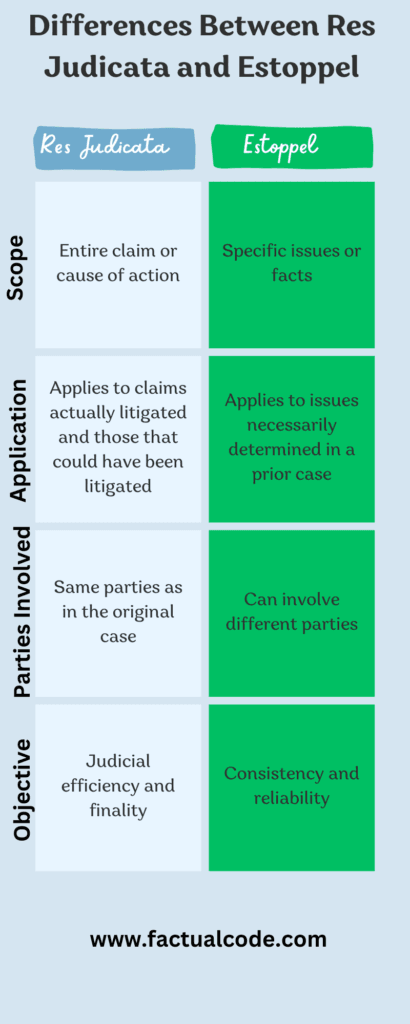When parties to a legal proceeding fail to appear in court as required, it can lead to serious consequences affecting the outcome of the case and the judicial process. Additionally, doctrines such as Res Judicata and Estoppel play significant roles in preventing redundant litigation and ensuring consistency in legal proceedings. This note comprehensively explores these topics, providing detailed insights for LLB students.
Consequences of Non-Appearance of Parties in a Case
Non-appearance of parties disrupts the judicial process and can lead to adverse legal consequences for both plaintiffs and defendants. The primary consequences are discussed below:
1. Default Judgment:
When a party, particularly the defendant, fails to appear in court despite being properly served with notice, the court may issue a default judgment against the absent party.
A default judgment is typically in favor of the appearing party and may include the remedies sought in the initial complaint.
2. Dismissal of Claims:
Plaintiff’s Non-Appearance:
If the plaintiff fails to appear in court, the court may dismiss the plaintiff’s claims without prejudice. This means the plaintiff retains the right to refile the case in the future.
In some instances, the court may dismiss the case with prejudice, barring the plaintiff from refiling.
Defendant’s Non-Appearance:
If the defendant fails to appear, the court may proceed ex parte and enter a default judgment in favor of the plaintiff.
This can lead to potential enforcement actions, including monetary penalties, seizure of assets, or other remedies.
3. Waiver of Rights:
Non-appearance can result in the waiver of procedural and substantive rights.
For Defendants:
Failure to appear and raise timely defenses can lead to the court deeming those defenses waived.
This may limit the defendant’s ability to challenge the claims or present evidence in subsequent proceedings.
4. Contempt of Court:
Failure to appear in court as required may lead to contempt of court proceedings.
Contempt sanctions can include fines, imprisonment, or other penalties to compel compliance with the court’s orders.
Persistent non-appearance can damage the credibility and legal standing of the defaulting party.
💡 Pro Tip: Non-appearance of parties can lead to serious consequences like dismissal or ex-parte judgments. For a detailed explanation of such procedural aspects, refer to our essential guide on How to Read CPC (Code of Civil Procedure, 1908).
Distinguishing Res Judicata and Estoppel
1. Res Judicata (Claim Preclusion):
Res Judicata is a doctrine that prevents parties from relitigating the same claim or cause of action that has already been adjudicated in a prior final judgment between the same parties.
Key Features:
Scope: It applies to both claims actually litigated and those that could have been litigated in the previous case.
Objective: Res Judicata promotes judicial efficiency and finality by preventing repetitive litigation.
Essential Elements:
A final judgment on the merits by a competent court.
Identity of parties in both the previous and subsequent cases.
Same cause of action involved in both cases.
Illustrative Case Law:
Daryao v. State of U.P., AIR 1961 SC 1457: The Supreme Court held that Res Judicata applies even to writ petitions to ensure the finality of decisions and judicial efficiency.
2. Estoppel (Issue Preclusion):
Estoppel is a principle that prevents a party from denying or asserting something contrary to what has already been established as truth in a prior legal proceeding.
Key Features:
Scope: It operates on specific issues or facts determined in a previous proceeding, regardless of whether the same claims are at issue.
Objective: Estoppel promotes consistency and reliability in judicial determinations.
Types of Estoppel:
Estoppel by Record: Precludes re-litigation of issues already determined by a court.
Promissory Estoppel: Prevents a party from going back on a promise made when another party has relied on it.
Collateral Estoppel: Bars re-litigation of specific factual issues already determined in a previous case.
Illustrative Case Law:
B. Gangadhar v. B.G. Rajalingam, AIR 1996 SC 780: The court emphasized that Estoppel prevents contradictory statements on previously adjudicated facts.

Conclusion:
The consequences of non-appearance in a legal case are significant and can impact the rights and remedies available to the parties involved. Courts may impose default judgments, dismiss claims, waive rights, and even initiate contempt proceedings to maintain judicial order. On the other hand, the doctrines of Res Judicata and Estoppel serve distinct but complementary functions in upholding the integrity of the judicial process. Res Judicata ensures the finality of entire claims, while Estoppel focuses on specific issues or facts already decided. Together, these principles contribute to judicial efficiency and consistency, making them crucial elements of legal practice and study.

